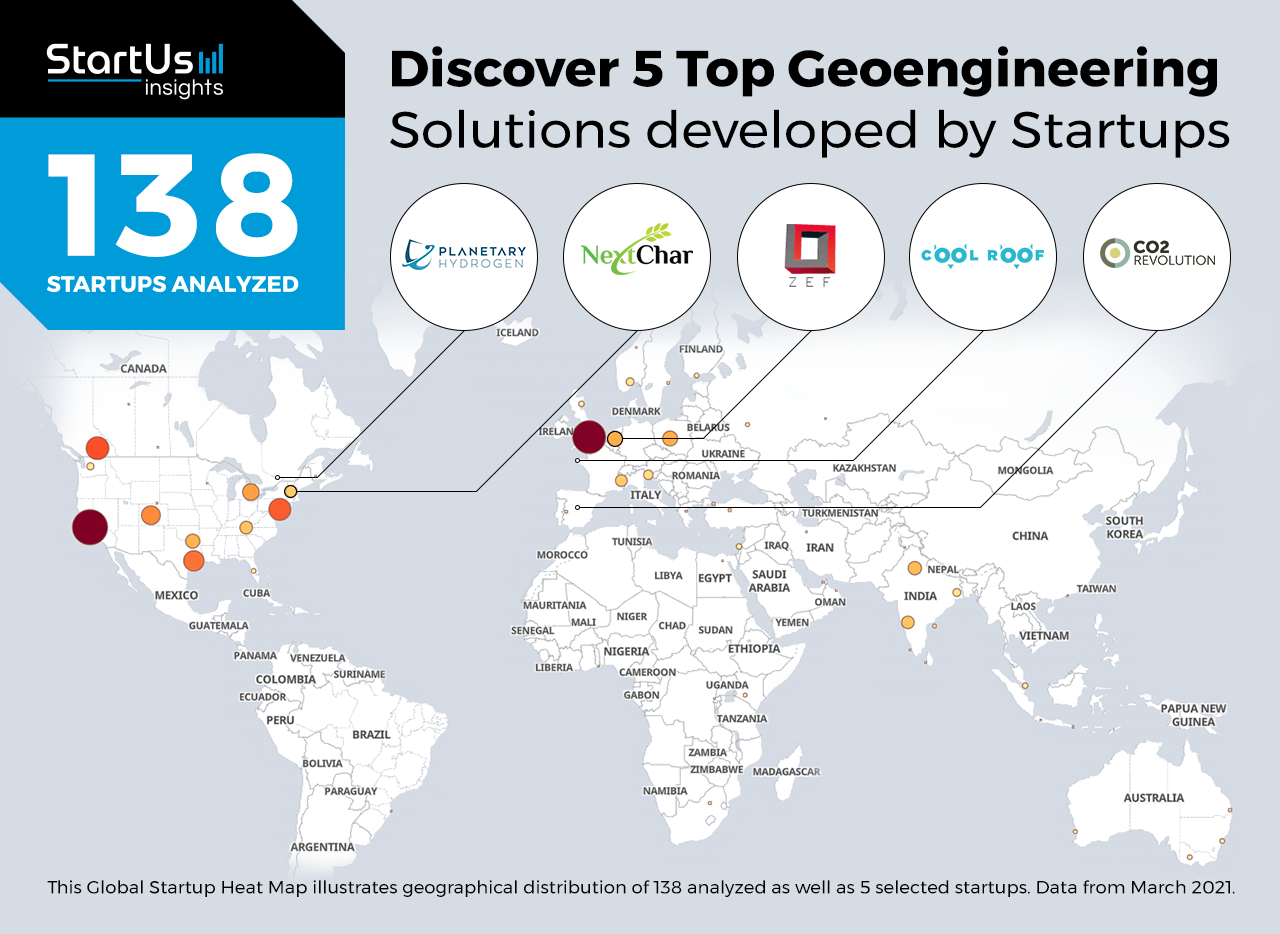Staying ahead of the technology curve means strengthening your competitive advantage. That is why we give you data-driven innovation insights. This time, you get to discover 5 hand-picked startups developing geoengineering solutions that impact climate change.
Global Startup Heat Map highlights 5 Top Geoengineering Solutions out of 138
The insights of this data-driven analysis are derived from the Big Data & Artificial Intelligence-powered StartUs Insights Discovery Platform, covering 1.379.000+ startups & scaleups globally. The platform gives you an exhaustive overview of emerging technologies & relevant startups within a specific field in just a few clicks.
The Global Startup Heat Map below reveals the distribution of the 138 exemplary startups & scaleups we analyzed for this research. Further, it highlights 5 geoengineering startups that we hand-picked based on criteria such as founding year, location, funding raised, and more. You get to explore the solutions of these 5 startups & scaleups in this report. For insights on the other 133 geoengineering solutions, get in touch.
Planetary Hydrogen advances Carbon Dioxide (CO2) Capture
Lowering the level of carbon dioxide from the atmosphere is one of the major objectives of geoengineering. The primary methods for CO2 capture include natural approaches such as afforestation and reforestation. However, artificial solutions such as direct air capture (DAC), enhanced weathering, and ocean alkalinity enhancement (OAE) are also on the rise. Startups develop DAC solutions that utilize the oceans as a carbon sink.
Canadian startup Planetary Hydrogen builds a DAC plant for hydrogen generation. The startup’s technology, Ocean Air Capture (OAC), removes carbon dioxide from the atmosphere and chemically turns it into an antacid during hydrogen production through water electrolysis. The antacid, when dumped into the ocean, reduces ocean acidification, thereby mitigating the threat for marine ecosystems.
Zero Emission Fuels develops Direct Air Capture Technology
The use of captured carbon dioxide for fuel production has a double positive impact on the environment. It reduces the CO2 levels in the atmosphere by direct capture, as well as by decarbonizing industries. Startups develop carbon capture, utilization & storage (CCUS) solutions to mitigate global warming. Such solutions increase the sustainability of the largest CO2 emitting industries such as oil & gas (O&G) and transportation.
Dutch startup Zero Emission Fuels develops DAC technologies optimized for sustainable fuel production. The startup’s facilities capture CO2 and water from the air and use them to produce methanol. The methanol produced improves sustainability in aviation, shipping, and the chemical industry. Powered by solar energy, ZEF’s carbon capture and utilization solutions extract more carbon from the atmosphere than they produce, thereby advancing the carbon-negative revolution.
CO2 Revolution develops Reforestation Solutions
Geoengineering with forest expansion represents a natural solution for CO2 removal. This solution aims at restoring the forest biomass, which plays a crucial role in carbon sequestration. To increase the planet’s natural CO2 removal capacities, startups apply automation and data analytics to maximize the efficiency and impact of reforestation and afforestation initiatives.
Spanish startup CO2 Revolution develops reforestation solutions to reduce CO2 emissions and mitigate deforestation. The startup applies drone technology and smart seeding techniques to automate reforestation. This increases the efficiency and effectiveness of seed planting processes. Additionally, CO2 Revolution leverages big data to determine the best course of action to achieve near-complete ecosystem restoration.
NextChar works on Biochar Production
Geoengineering with biochar captures carbon dioxide during the pyrolysis process and has the potential to reduce greenhouse gas (GHG) concentration in the atmosphere. Additionally, biochar contributes to sustainable agricultural development by increasing nutrient and water retention in soil. To help both agriculture and the environment, startups work on biochar production solutions.
US-based startup NextChar manufactures biochar for residential, commercial, and industrial applications. The startup uses a proprietary pyrolysis technology for consistent biomass heating. It traps carbon dioxide in the pyrolysis process. Moreover, NextChar’s biochar solution addresses the food security issue by increasing soil fertility with biochar.
Cool Roof France advances Surface Albedo Geoengineering
Geoengineering approaches aim to mitigate global warming by decreasing solar radiation through orbital mirror installations, stratospheric aerosol injection, and albedo modifications. While the former two techniques are still under scientific investigation, albedo modifications already find commercial applications. In particular, startups apply radiation reflection paint to rooftops of large buildings to decrease building temperatures and reduce CO2 pollution from air conditioning systems.
French startup Cool Roof France increases rooftop reflection of solar radiation. The startup’s reflective, thermal white paint helps prevent overheating in buildings, thereby reducing the need for air conditioning and the accompanying CO2 emissions. The radiation reflecting paint mitigates the development of urban heat islands during the seasons of high solar activity and advances surface albedo geoengineering technologies.
Discover Startups Impacting Climate Change
Startups such as the examples highlighted in this report focus on soil management, water management, and emissions reduction. While all of these technologies play a major role in tackling climate change, they only represent the tip of the iceberg. To explore more sustainable technologies, simply get in touch to let us look into your areas of interest. For a more general overview, you can download one of our free Industry Innovation Reports to save your time and improve strategic decision-making.










